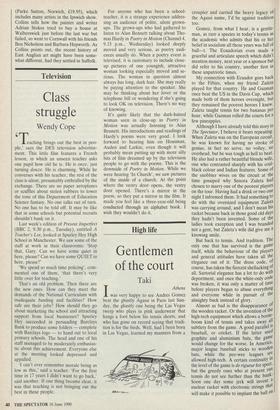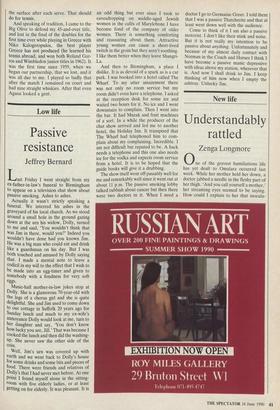High life
Gentlemen of the court
Taki
Athens waswas very happy to see Andres Gomez beat the ghastly Agassi in Paris last Sun- day, the ghastly one being the Las Vegas twerp who plays in pink underwear that hangs a foot below his tennis shorts, and who has gone on record saying that tradi- tion is for the birds. Well, had I been born in Las Vegas, learned my manners from a croupier and carried the heavy legacy of the Agassi name, I'd be against tradition too.
Gomez, from what I hear, is a gentle- man, as rare a species in today's tennis as the academic who admits that his or her belief in socialism all these years was full of bull---t. The Ecuadorian even made a graceful and articulate speech which didn't mention money, next year or a sponsor but did refer to his country, another first in these unpatriotic times.
My connection with Ecuador goes back to the Fifties, when my friend Zuleta played for that country. He and Guzman once beat the US in the Davis Cup, which made both of them heroes overnight, but they remained the poorest heroes I knew. Zuleta taught tennis for two bananas per hour, while Guzman rolled the courts for a few pineapples. Although I have already told this story in The Spectator, I believe it bears repeating. When Zuleta was on the European circuit, he was known for having no stroke of genius, in fact no serve, no volley, no overhead, but he was tough as hell to beat. He also had a rather beautiful blonde wife, one who contrasted sharply with his coal- black colour and Indian features. Some of the snobbier wives on the circuit at the time gossiped why Senora Zuleta had chosen to marry one of the poorest players on the tour. Having had a drink or two one night I informed them. It had something to do with the oversized equipment Zuleta was carrying around, and I don't mean his racket because back in those good old days they hadn't been invented. Some of the ladies took exception and I was branded not a gent, but Zuleta's wife did give me a knowing smile. But back to tennis. And tradition. The only one that has survived is the game itself, while the behaviour of the players and general attitudes have taken all the elegance out of it. The dress code, 0f, course, has taken the fiercest shellacking 01 all. Sartorial elegance has a lot to do with deportment, and once the white-only code was broken, it was only a matter of time before players began to abuse everything and everyone while in pursuit of the almighty buck instead of glory. Almost as bad is the disappearance of the wooden racket. Or the invention of the high-tech equipment which allows a boom- boom kind of tennis and takes away all subtlety from the game. A good parallel is baseball, or cricket. If the latter used graphite and aluminium bats, the game would change for the worse. In America, major league baseball sticks to wooden bats, while the pee-wee leagues are allowed high-tech. A certain continuity in the level of the game is de rigueur for sporty but the greedy ones who at present run tennis do not see further than the bank. Soon one day some jerk will invent a nuclear racket with electronic strings that will make it possible to implant the ball on the surface after each serve. That should do for tennis.
And speaking of tradition, I came to the Big Olive to defend my 45-and-over title, and lost in the final of the doubles for the first time ever while playing in Greece with Niko Kalogeropulos, the best player Greece has not produced (he learned his tennis abroad, and won both Roland Gar- ros and Wimbledon junior titles in 1962). It was the first time since 1959, when • we began our partnership, that we lost, and it was all due to me. I played so badly that after the match I remained on court and had nine straight whiskies. After that even Agassi looked a gent.



















































 Previous page
Previous page